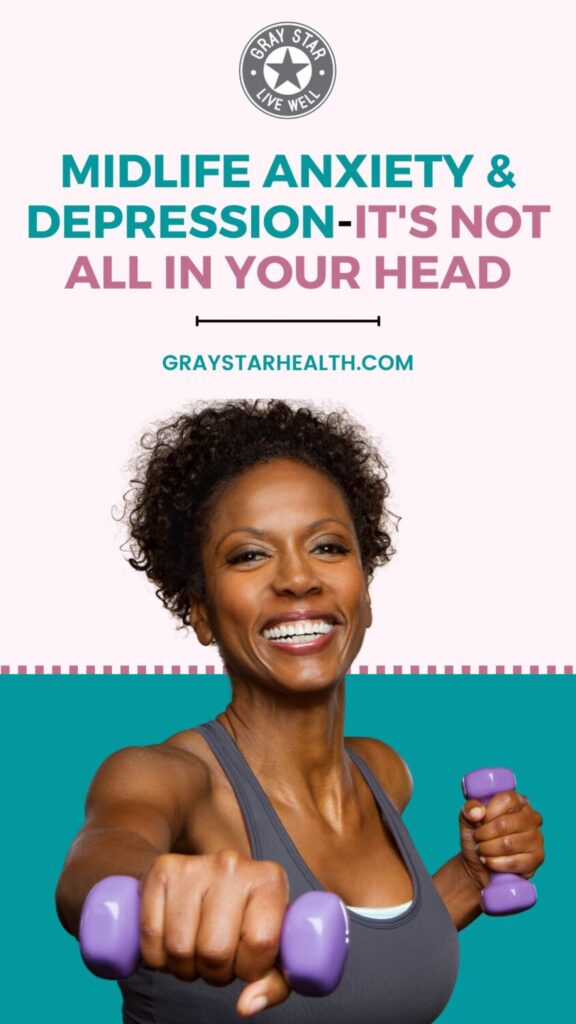If you’ve hit your 40s or 50s and suddenly feel like your mood is all over the place—one minute fine, the next irritable, anxious, or even teary for no clear reason—you’re not imagining it. The shifts in estrogen, progesterone, and thyroid hormones during midlife have a direct impact on the brain, influencing key neurotransmitters like serotonin, dopamine, and GABA. These are the chemicals that help regulate mood, motivation, and calmness, which is why so many women experience anxiety, depression, and emotional ups and downs during perimenopause and menopause.
The good news? You don’t have to suffer! There are ways to support your body through this transition and regain your emotional balance!

Hormones and your Mood – what’s the connection?
The Estrogen Effect: Why You Might Feel More Down or Just Blah
Estrogen is like a mood-boosting powerhouse. It helps regulate serotonin (the “feel-good” neurotransmitter) and dopamine (the “motivation and reward” chemical). The dramatic drop in estrogen during perimenopause and menopause is one of the main reasons women struggle with mood swings, depression, lack of motivation and even brain fog.
Less estrogen means less serotonin and dopamine, which can lead to increased stress, less focus and more irritability. It’s why many women notice they feel more depression or down, lacking motivation and feeling less resilient to daily stressors as they move through this phase.
Progesterone & GABA: The Cool, Calm & Collected Factor
Progesterone has a strong connection to GABA, the brain’s calming neurotransmitter. When progesterone levels fluctuate or decline, GABA levels can drop, making it harder to relax and sleep.
This can leave women feeling more on edge, restless, anxious and even prone to panic attacks.
As a result, anxiety may feel more intense, and stress can become harder to manage. If you’ve been struggling with sleep disturbances, feeling on edge, or a having a constant “wired but tired” feeling, declining progesterone could be the culprit, especially during perimenopause and menopause when hormone shifts are most pronounced..

Thyroid, Dopamine & Serotonin: The Missing Link
Your thyroid is another key player in emotional resilience. It’s not not just about metabolism—it’s deeply tied to how we feel emotionally, too. Thyroid hormones influence every system in your body, from heart health to digestion, and even your brain. They plan a key role in the production of dopamine and serotonin,
When thyroid hormones are low – more common in midlife – it impacts the brain and nervous system, slowing down dopamine and serotonin production. This can lead to fatigue, lack of motivation, and a general feeling of “blah.” Since thyroid issues can mimic symptoms of depression and anxiety, it’s essential to check thyroid function if you’re feeling off.

Strategies to Support Your Mood & Emotional Health
If your emotions feel out of control, there’s what YOU CAN DO to support your hormones and neurotransmitters naturally.
- Daily Movement – Exercise boosts mood by increasing the production of endorphins, the body’s natural “feel-good” chemicals, which help reduce stress and promote a sense of well-being. It also enhances the release of neurotransmitters like serotonin and dopamine, which play a key role in regulating mood, reducing anxiety, and improving overall mental health. Keep in mind, this doesn’t need to be high intensity, walking every day will do wonders for your mental health!
- Prioritize Protein & Nutrition – What you eat matters! Protein is essential for neurotransmitter production, so be sure to get enough high-quality sources like eggs, fish, chicken, and plant-based proteins. Protein intake is especially important in midlife for both brain and metabolic health. Aim for 30-40 grams of protein at each of your meals. If you are struggling to get enough protein, a high quality protein powder can be helpful.
- Focus on Gut Health – The gut-brain connection is real. What happens in your gut directly impacts the brain and mood through the gut-brain axis, a communication network linking the digestive system and central nervous system. A healthy gut microbiome supports the production of neurotransmitters like serotonin and dopamine, while a dysbiotic microbiome and leaky gut can contribute to inflammation, anxiety, depression, and brain fog. Focus on fiber from vegetables, fruits and high quality carbs. Consider digestive support and a probiotic.
- Manage Stress & Prioritize Sleep – Chronic stress depletes neurotransmitters and worsens hormone imbalances. Try mindfulness, meditation, or even a simple daily walk. Calming activities help to calm and reset the brain. Quality sleep is also critical. Establish a calming nighttime routine – dim the lights, stay off your screens, take a bath, read a book. Supplement with magnesium or adaptogenic herbs if you struggle to wind down at night.
- Use Supplements Wisely – Certain supplements can be game-changers for mood support. Magnesium, amino acids, probiotics, omega-3s, B vitamins, herbs and adaptogens can help support brain chemistry and stress resilience. If you aren’t sure where to start, meet with your practitioner to determine which will be best for you.
- Consider HRT (Hormone Replacement Therapy) – Midlife hormone shifts are a major contributor to mood changes. Lifestyle changes are important and cannot be overlood. However, bioidentical hormone therapy is always worth discussing with your healthcare provider. It can help restore estrogen and progesterone levels, directly supporting mood and brain function.
- Test, Don’t Guess – Midlife is the perfect time to take a closer look at what’s happening within your body. Testing allows you to stop trying to guess what you should do when it comes to your health. Functional lab testing combined with in depth blood work can provide insight into what strategies will best support you now and in the future.

You’re Not Alone in This Journey
By supporting your hormones, neurotransmitters, and overall health, you can reclaim your emotional balance and feel more like yourself again. If you’re struggling, know that you’re not alone—and there are solutions to help you navigate this transition with more ease and confidence.
This process takes time, but every small step you take matters. Whether it’s incorporating more protein or veggies, taking five minutes to breathe deeply, or scheduling a hormone and thyroid panel, you are moving closer to feeling better—inside and out.
You deserve to feel calm, confident, and in control. And with the right support and tools, it’s entirely possible.
To you health and resilience!









